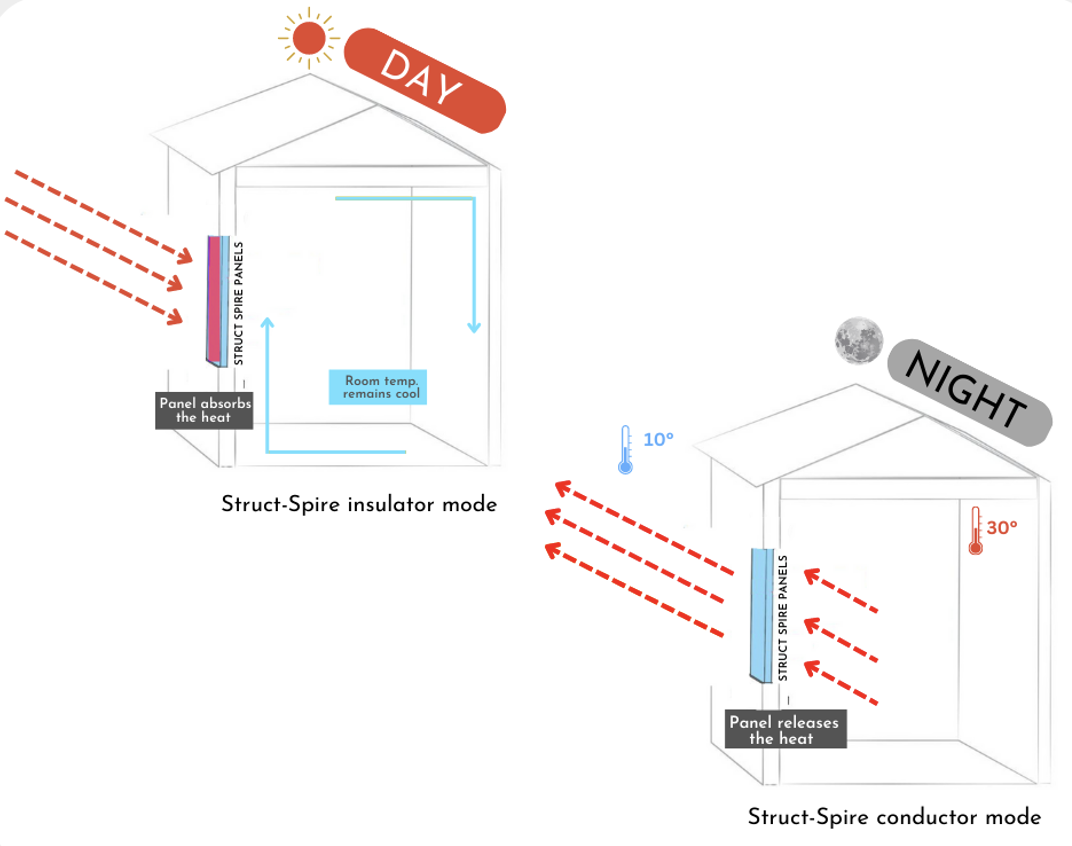Sun Devils spark innovation in building sustainability

The Sun Devil Sparks aim to boost buildings’ energy efficiency by conceptualizing a wall panel that will absorb heat during the day and release it at night, cooling indoor spaces with less energy consumption. Graphic by Hayley Hilborn and Erika Gronek, ASU/Midjourney
Each year, Schneider Electric, an energy solutions and digital automation company, hosts a student competition to elevate new ideas in sustainability called Schneider Go Green. In 2023, the competition tasked applicants to conceptualize an idea that would revolutionize circularity and energy efficiency for buildings.
Hussain Bhavnagarwala, a student earning his master’s degree in mechanical engineering at the School for Engineering of Matter, Transport and Energy, part of the Ira A. Fulton Schools of Engineering at Arizona State University, heard about the competition from mechanical and aerospace engineering Professor Patrick Phelan while enrolled in a course studying materials’ heat transfer properties. Bhavnagarwala’s studies inspired him to develop an idea surrounding the transfer of heat to improve sustainability in building materials.
“Heat transfer is one of my favorite subjects,” Bhavnagarwala said. “My father, being a heating, ventilation and air conditioning engineer himself, works a lot in this area, and I tend to have a lot of discussions with him on ‘green’ buildings. Energy efficiency is very closely related to heat transfer, so this motivated me to take up this competition with a keen interest.”
When looking to sign up for the competition online, Bhavnagarwala found an ASU team – the Sun Devil Sparks – was already registered. The team had been created by Deanna Chaney, an ASU Online undergraduate student based in Tennessee. Chaney is earning her bachelor’s degree in sustainability with a focus on energy, materials and technology in the School of Sustainability, part of the College of Global Futures.
Chaney decided to enroll in the competition since this year’s challenge focuses on innovating sustainable energy solutions for urban spaces, which she said is right up her “academic alley.”
Bhavnagarwala joined the team on the competition website. The two later recruited two teammates: Tosin Clement, a graduate student studying business analytics at the University of Louisville, and Sai Saketh Narabathula, an ASU student pursuing a master’s degree in mechanical engineering.
The idea
The first phase of the competition required teams to submit a 10-slide presentation conceptualizing their idea.
When thinking of ways to improve the sustainability of buildings, the team started by identifying one of the biggest energy expenders in the home: air conditioners. During the day, air conditioning units consume large quantities of energy to cool buildings, but this function is less necessary at night when temperatures cool.
However, the insulation in most buildings retains heat even after the sun sets, making interiors hot and necessitating continued climate control. The students worked to reduce this avoidable energy consumption by developing a wall panel that works as both a heat conductor and an insulator. The panel will operate as an insulator during the day and, at the flip of a switch, become a conductor at night to expel the retained heat outside of the building.
This kind of material, a substance that absorbs and releases heat energy when it changes phases, is referred to as a phase change material, or PCM. PCMs are already being researched for different applications such as use in car batteries to maintain ideal operating temperature.
The team’s idea and presentation earned them a spot in the competition’s North American finals, where they will travel to Schneider Electric’s North American headquarters in Tennessee to present their idea to judges.
A diagram showing how the students’ idea, which they have dubbed the Struct-Spire, will work to keep spaces cooler. Graphic courtesy Sun Devil Sparks
The road ahead
To further explicate this idea and ensure thorough presentations from the students, Schneider assigned mentors to each team to point out challenges that must be addressed to make their ideas into commercially viable products.
The Sun Devil Sparks met with three mentors from Schneider: Chris Campbell, a system architect; Marissa Ainsworth, a sustainability and decarbonization strategy leader; and Saeid Golshaeian, the director of Schneider’s industrial automation business unit. After incorporating their mentors’ feedback, the team is reimagining their presentation for the finals in June.
Chaney is investigating the variety of sustainability goals the team can target with their idea. She will also demonstrate how much energy the wall panels will save by investigating other products with similar functions. The team’s mentors also encouraged them to address the circularity of their product to establish ways it can be produced and disposed of sustainably.
Bhavnagarwala is researching the necessary technical properties that will guide the design, such as the most effective material to use and how thick the panel must be, to establish production parameters.
Narabathula is learning to work with Blender, a 3D computer graphics software tool, to develop an animated simulation of the wall panel for the team’s presentation.
While the students have already gained insight into product development with their Schneider mentors’ input, further educational and career growth opportunities abound.
During their visit to the Schneider headquarters in Tennessee, the students will tour the facility and have the opportunity to interview for internships at the company.
If the students are successful in the North American finals, they will advance to the international finals, traveling to Schneider’s global headquarters in Paris.
Though the experience alone is a career builder, Bhavnagarwala said the company’s track record of hiring the winning students and furthering their research idea is a motivator for the Sun Devil Sparks to give this competition their all.
The competition is a full-circle moment for Bhavnagarwala, who grew up next to a Schneider manufacturing facility in his hometown of Chennai, India. He said he would love to pursue employment with the company and possibly work in the location close to his roots.
Chaney, who is also a student in Barrett, The Honors College, said the competition is an opportunity for her to “gain real-life experience in working with a team on big, innovative ideas.”
“I want to establish connections with sustainability professionals in the field of energy and technology and possibly get my foot in the door for a future internship,” she said. “I want to better acquaint myself with skills and knowledge in the field of sustainability that I haven’t learned in my coursework before I graduate, and I think this project has done just that.”
Phelan, who also serves as the Fulton Schools assistant dean of graduate programs, expresses his excitement for the students’ spirit of innovation.
“The success of this diverse student team speaks volumes about the capabilities of our students to tackle engineering’s biggest problems,” he said. “The innovative concept from this team may help deliver on the promise of making buildings truly sustainable.”
Update: As of June 6, 2023, the Sun Devils Sparks were named the winners of the North American division of the Schneider Go Green competition. In the fall, they will travel to one of Schneider's overseas headquarters to compete against seven other teams from all over the world in the finals.
More Science and technology

ASU-led space telescope is ready to fly
The Star Planet Activity Research CubeSat, or SPARCS, a small space telescope that will monitor the flares and sunspot activity…

ASU at the heart of the state's revitalized microelectronics industry
A stronger local economy, more reliable technology, and a future where our computers and devices do the impossible: that’s the…

Breakthrough copper alloy achieves unprecedented high-temperature performance
A team of researchers from Arizona State University, the U.S. Army Research Laboratory, Lehigh University and Louisiana State…


